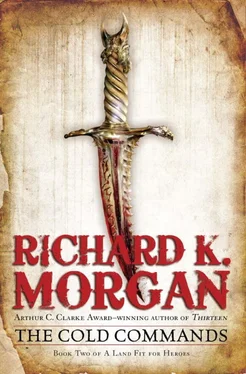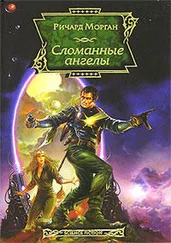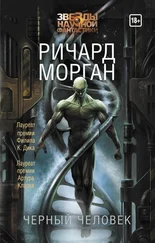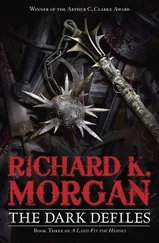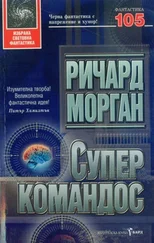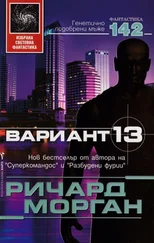Hjel either ignored the flirt or didn’t hear it. “And I had already—will already have—told you this story. There’s logic in that, I suppose, though I have never seen the Margins play this particular trick before. And I don’t imagine it presages anything very good.”
The hat brim tipped down, hooded the eyes for a long moment. When it rose again, Ringil thought he could see the trace of a smile in the shadows beneath.
“It’s a pretty good scam, right? A ragged band of entertainers and camp followers claiming homage as the thousand-year descendants of the royal court in hiding. That old Bloodline-in-Exile thing. A wandering minstrel and conjuror, in truth the dispossessed, rightful king. Nice work if you can get it.”
Ringil shrugged. “Well. Now you come to mention it.”
“The Margins help, of course. They ebb and flow like a tide across the marsh, wash the ruins under for hours or months at a time, spit them back up again. Live alongside something like that, you can’t help but give credence to fairy-tale notions.”
“Tide?”
“Yes.” Absently. Hjel seemed not to have noticed Ringil’s fumbling unfamiliarity with the word. “Can’t you feel the difference? We are out again, the shadows ebb—for now. But it’s not always so comfortable. Wander incautiously, lose yourself out on the marsh and you can be swept away, lost forever or for merely the handful of decades that take your loved ones from you. There are stories of—”
“Yeah, heard them.” Ringil shifted restlessly. In his world, the marsh dwellers told those tales all the time, usually on the pitches at Strov market with a horny palm out for payment. “Heard them all, front and back.”
The hat brim dipped, perhaps in acknowledgment. “Well, what you may not have heard is that even those wandering with some education and a map are likely still to come back with gifts at best uncertain and scars they would rather not have earned. And if you’ve grown up with this as truth, well, why not accept that these gaunt, wild-eyed, motley-clad players might once have been a mighty dynasty. They don’t ask much, after all, and the show is a delight, especially for the children. Why not cough up a few coins? Why not share what food and shelter you have to give them, step away for a few hours from the grind of your daily existence into the exotic fantasy they give you in return. Why not cave in to easy belief?”
“And do you?”
“Do I what? Believe that I am the direct descendant of the once-great sorcerer kings of Drel-en-ilynyr? That my ancestors fled into the Margins when they could not defeat the Scourge from the South, and that their gracious subjects continue to protect and succor them to this day, for all that the Scourge is long gone from living memory? That my bloodline merely awaits its time to rise again?” Hjel’s smile flickered again, ember-like. “Why would I not want to believe something like that?”
“Oh, I don’t know. Because it’s a made-up pile of pigshit, maybe?”
The mandolin master nodded soberly. “There is always that possibility. But pigshit or not, would it really make so much difference? A destiny is a handy thing to have in your pocket, however worn and unlikely it might be.”
“Well, if you say so—Prince of Rags.”
“I do say so.” Hjel looked into the fire for a while. If he’d taken offense it didn’t show. “Men are lightweight in this world, Ringil Eskiath; blown about on their own ungoverned impulses like marsh-flower seed in a spring storm. Anybody can see they need anchoring. A manifest destiny, even a shared and shabby secondhand one, provides the ballast for each man and the binding for a whole people. If it’s a shared lie, does it really matter?”
“If you carried a sword, you’d know the answer to that.”
“Yes, if I carried a sword. But as you see”—dance of hands, the mandolin gave up a brief ripple of chords—“I do not.”
“Aren’t you the lucky one.”
Ringil stared down into his side of the ember bed, hearing the small pop and snap of the waning fire. No comfort there. Against the sounds of the flames, he thought he heard screams and distant weeping. He wondered what Hjel saw from his side. He knew that the other man was watching him now, but found himself curiously unwilling to look up and meet the hat brim gaze across the heated air.
“You met it, didn’t you?” Hjel’s tone was mild, but there was no hint of a question in it. “At the crossroads.”
The demon familiar dug in its icy claws again.
“Its trace clings to you, Ringil Eskiath. Like cold to leather long after the wearer comes inside. Dispossessed or not, I come from a long line of sorcerers; my gifts are good for this much at least. Don’t deny where you’ve been.” A long pause. “What did it tell you?”
Ringil looked up. There was no challenge waiting for him across the fireside in the other man’s eyes. Instead, he felt something a little like desperation leaking out of Hjel the Dispossessed.
“You’ve seen it, too?”
Hjel sat closer in to the fire. “My family has a long association with it. Family legend has it that my ancestors banished it to the Margins when they founded the city, and were cursed as a result. Well, who knows? But each of us, each eldest heir when we come of age, must go after it into the Margins, find it at the crossroads and ask it to gift us with something, one way or the other.”
“You banished it, and it gives you gifts in return?”
A haggard smile. “They say it has a sense of humor. And the gifts are… ambiguous. Some of my ancestors returned in triumph, some came home broken. And some did not return at all.”
“You?” Ringil realized that he was leaning forward, rapt.
Hjel shrugged. “Well, I did return.”
“What did it gift you with?”
Scatter of notes from the mandolin, like birds off into the gloom. “Can’t you guess?”
The fire popped and crackled quietly to itself.
“You couldn’t play before?”
“Oh, I had some meager talent, I suppose. A certain gypsy flair. Grow up among traveling players, the heir apparent of the band, you learn, more or less in self-defense. But there was nothing beyond that, no. Nothing that would open the stiff barrel taps of a hard man’s eyes , as the poet has it.”
Ringil grimaced, because that sounded alarmingly like a line out of early Skimil Shend.
“And now? You can make men weep with your music?”
Another small, painful smile. “Now I can crack a man’s heart to a halt with my music, if I choose. Spill out his soul and send it on to the crossroads. Women are harder, but that, too, can be done with a little effort. A gift of somewhat limited application, of course, if you plan to keep your audiences happy. But, as I said, the creature has a sense of humor.”
“It’s not what you wanted?”
“Am I so obvious?” For the first time, there was a trace of real bitterness in Hjel’s voice.
“What did you want, then?”
But the answer already loomed. Ringil’s gaze fell to where the Ravensfriend lay at his side in its scabbard and the loosed coils of the shoulder harness rig. And he knew, without looking up, that Hjel had seen it, too.
“A bloodline in exile,” the dispossessed prince murmured. “What young man does not dream of bringing his family back to the glory of earlier days? What young man doesn’t want the cold command of steel in his clenched fist? Something sharp and powerful. Something to hold.”
“You asked for that?”
“Yeah, I asked for that. A sword of power, to lead my followers and carve out a new kingdom.” An ironic gesture around. “To build these ruins back up, to raise new towers on the marsh horizon. Instead, I get an improved facility with stringed instruments and a better singing voice. You got to laugh, right?”
Читать дальше
